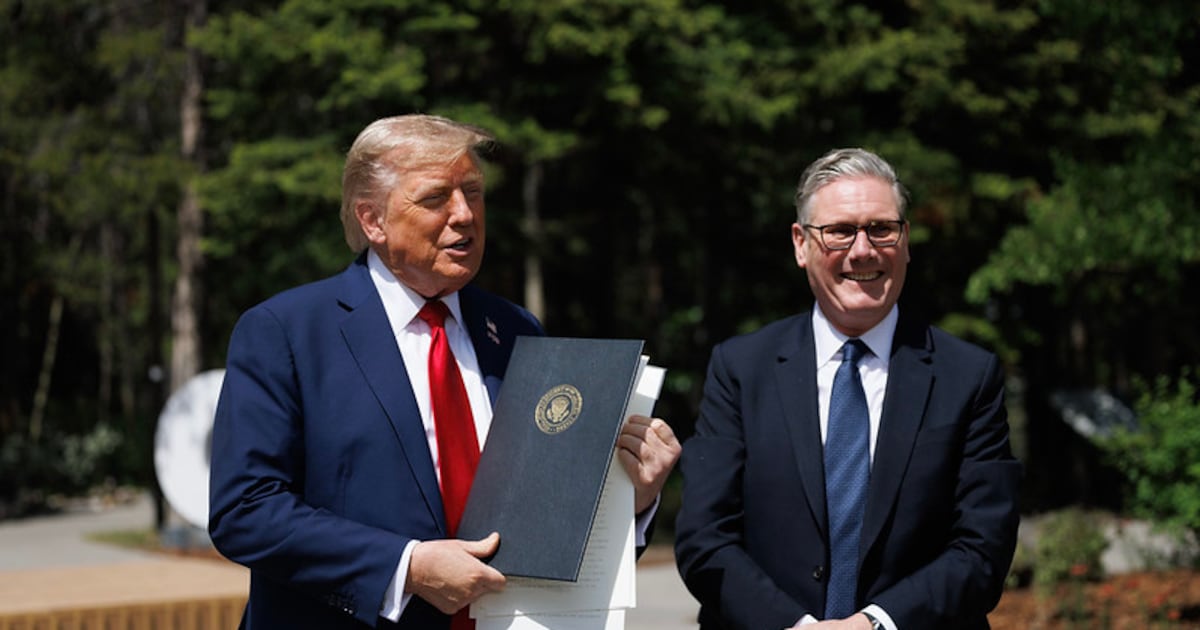The news comes following weeks of talks between the two countries and is the first pact that the White House has announced since it imposed its extensive tariffs.
Now with part of the UK-US agreement signed, the UK Government hopes the deal will protect Britain against the fallout of US tariffs.
When asked about future tariffs, President Donald Trump said the UK is “very well protected” adding that this is because he “likes them”.
The agreement still includes a 10% levy on most UK goods and steel remains a question mark, with the original 25% tariffs still in place. Although this is less than the global rate of 50% the UK Government had previously said work was under way to remove these entirely and it has confirmed that it will continue to press on this.
The deal also includes reciprocal access to 13,000 metric tonnes beef for both US and British farmers – meaning the UK can export to the US too.
There will be concerns over what the deal could mean for UK food standards, with previous fears aired during Trump’s first presidency over a US deal potentially weakening Britain’s food safety. However, the UK Government has said it has “been clear that any US imports will need to meet UK food safety standards” and “that has not changed” since it agreed this deal.
The UK Government added that it will be updating Parliament on the implementation of quotas on US beef and ethanol.
Steel tariffs could hit canned goods
Commenting on the deal, Rod Addy, director general at the Provision Trade Federation (PTF) told Food Manufacture: “US estimates suggest the maintenance of 25% steel tariffs on imports into the US could raise the price of canned foods by up to 15%. This could hit UK canned food exports.
“While the UK has fared better than many countries, including EU member states, a baseline tariff of 10% will still apply to most UK exports to the US, including food products, so that will favour US domestic producers.
“Food exporters set to do the best out of this will be producers exporting artisan products sold at a premium. In most cases, US consumers already buying such foods are unlikely to be put off by the slightly higher price point, but just how much prices will be passed on remains to be seen.
“Lastly, the removal of tariffs on US bioethanol exports to the UK for a quota of 1.4bn litres looks set to hit UK farmers growing wheat for bioethanol hard, potentially rendering them unable to compete. It could also lead to job losses for UK bioethanol producers.
“With all that said, UK exporters will be relieved that they are not facing the higher tariffs being imposed by the US on many nations.”
Beef: Less about quantity, more about quality
“With a growing shortage of livestock in the UK, we are becoming more reliant on importing beef and other products to feed this country’s needs, which poses a food security issue,” added Nick Allen, CEO at the British Meat Processors Association (BMPA).
“Our concern, which we have voiced directly to government ministers, is that the detail surrounding this 13,000 tonne quota should be carefully specified during final negotiations; something that wasn’t done properly for the Australian trade deal.
“The issue for the British meat industry is less about how much beef and more about what kind of beef is allowed in. It’s certain that US exporters will concentrate on the high value, premium end of the market by sending cuts like strip loins to the UK. Where value and profit is made up is in the high-end cuts like sirloins, rumps and fillet steaks. Without these higher value products, beef production, regardless of where in the world it happens, wouldn’t be viable.
“To illustrate the impact this could have: 13,000 tonnes of strip loins represents approximately 30% of that same cut we produce domestically. Indeed, the Australian year-two quota of 43,333 tonnes (this rises every year for 10 years) would represent all the strip loins the UK produces. If the full quotas are used, this would represent crippling competition for British farmers.
“BMPA has urged government ministers not to make the same mistakes as were made during negotiations of the Australia deal and, carefully set specific quantities of eligible product to avoid damaging our domestic meat and livestock industry.”
